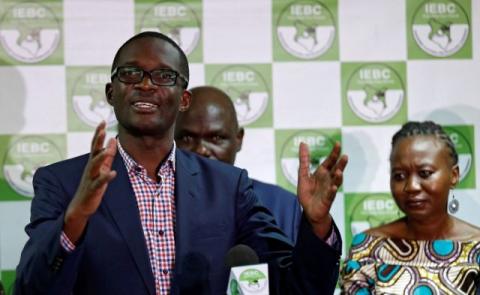Advertisement
Eyes on Odinga as Kenya election board CEO takes leave before vote
NAIROBI (Reuters) - The chief executive of Kenya's electoral board, whose sacking the opposition has demanded ahead of a presidential election re-run due next week, said on Friday he was taking three weeks' leave.
Uncertainty over who will participate in the election and concerns that it may not proceed peacefully have left Kenya, a traditionally stable Western ally in an often chaotic region, mired in political crisis.
The volatile build-up to the Oct. 26 vote has revived memories for Kenyans of ethnically charged violence that killed around 1,200 people after a disputed election in 2007.
Electoral board CEO Ezra Chiloba told Reuters that, in light of the opposition's demands, he was going on leave, and that all arrangements for next week's vote were in place.
Opposition leader Raila Odinga, the main challenger to President Uhuru Kenyatta in an election in August that was subsequently nullified, has said he will boycott the re-run unless several demands, including the sacking of Chiloba, are met.
At least 45 people died nationwide in the police crackdown on opposition supporters after the August vote, including a six-month old baby struck on the head by a police baton.
It was unclear if Chiloba's announcement might prompt a change of stance from Odinga, whose spokesman could not immediately be reached for comment.
"The crystal ball is very cloudy at the moment," a senior western diplomat in Nairobi told Reuters. "The situation is changing by the hour."
REVIEW OF BOYCOTT?
The electoral board has said next week's election will go ahead.
Odinga met its chairman Wafula Chebukati on Thursday and later told reporters that if there were serious consultations and serious reforms, the opposition could review its boycott.
Chebukati had warned a day earlier that he could not guarantee the election would be free and fair, citing interference from politicians and threats of violence against colleagues. A fellow board member resigned this week after fleeing to the United States, saying she feared for her life.
The opposition has held near-daily protests demanding electoral reforms and the sacking of board officials. Police said on Friday four people were killed as a result of their interventions to stop demonstrations.
Kenyatta, whose August victory the Supreme Court invalidated on procedural grounds, has meanwhile urged Kenyans to come out in large numbers to vote, insisting the ballot be held.
On Thursday, he snubbed an invitation to meet Chebukati, saying he would instead spend the time campaigning.
In a speech in Nairobi on Friday. Kenyatta said the election must not divide the nation or push it to the brink, referencing the violence that followed the 2007 vote.
But he also warned that disruptions of the vote by "those who thrive in chaos and relish anarchy" would not be tolerated and said security forces "have been enhanced and appropriately deployed to maintain law and order."
Police spokesman George Kinoti said in a statement on Friday that in the police response to protests this month, ten officers were injured.
(Additional reporting by Katharine Houreld and Humphrey Malalo; Writing by Maggie Fick; Editing by John Stonestreet)



















Add new comment